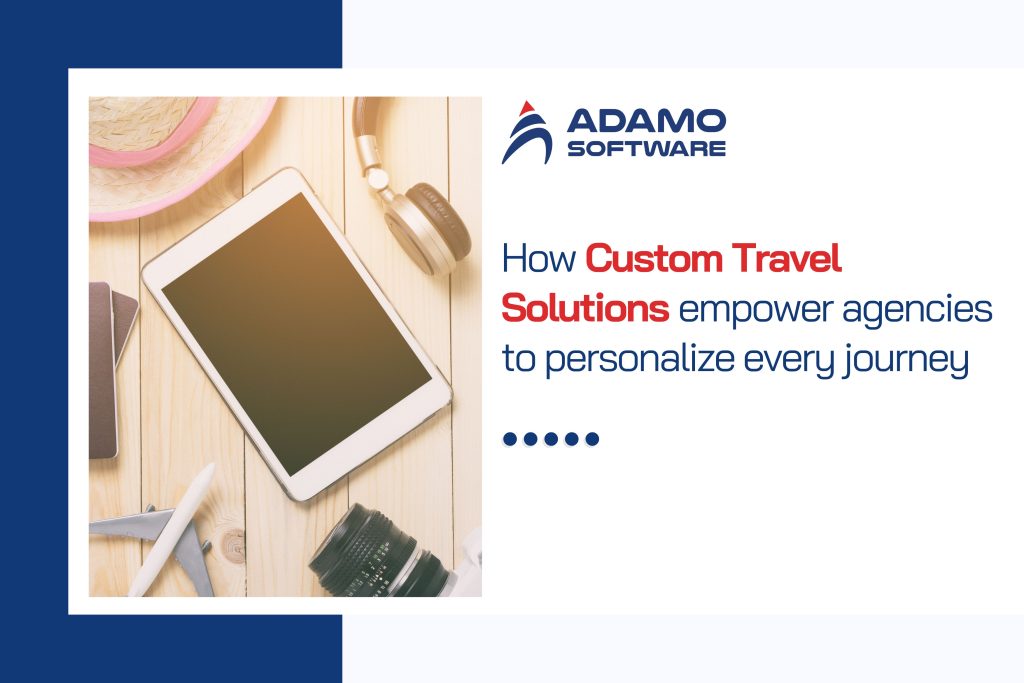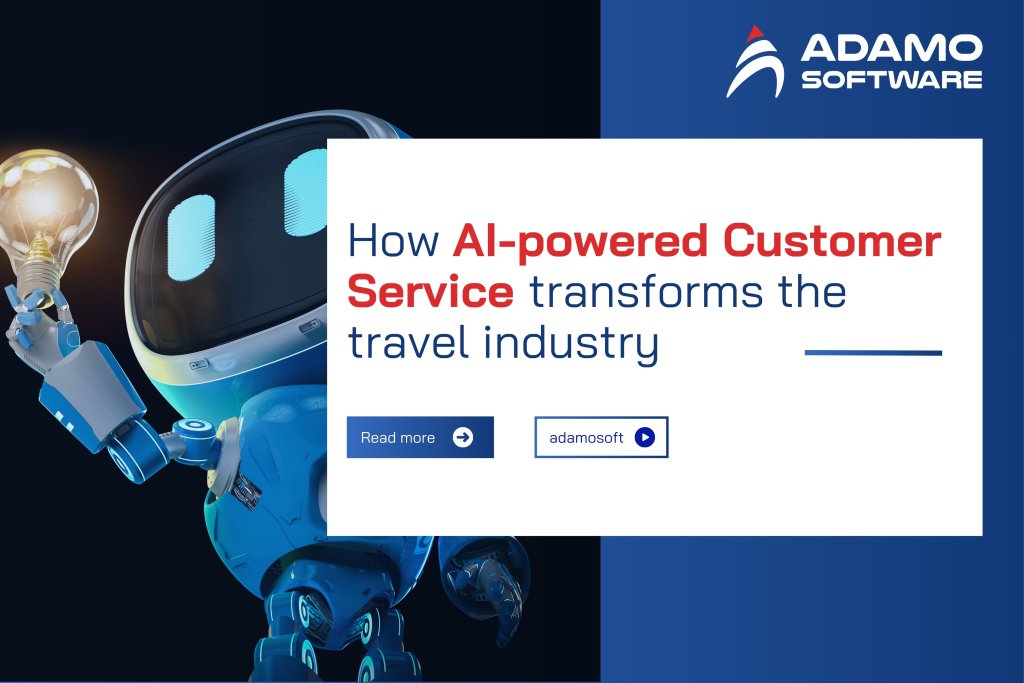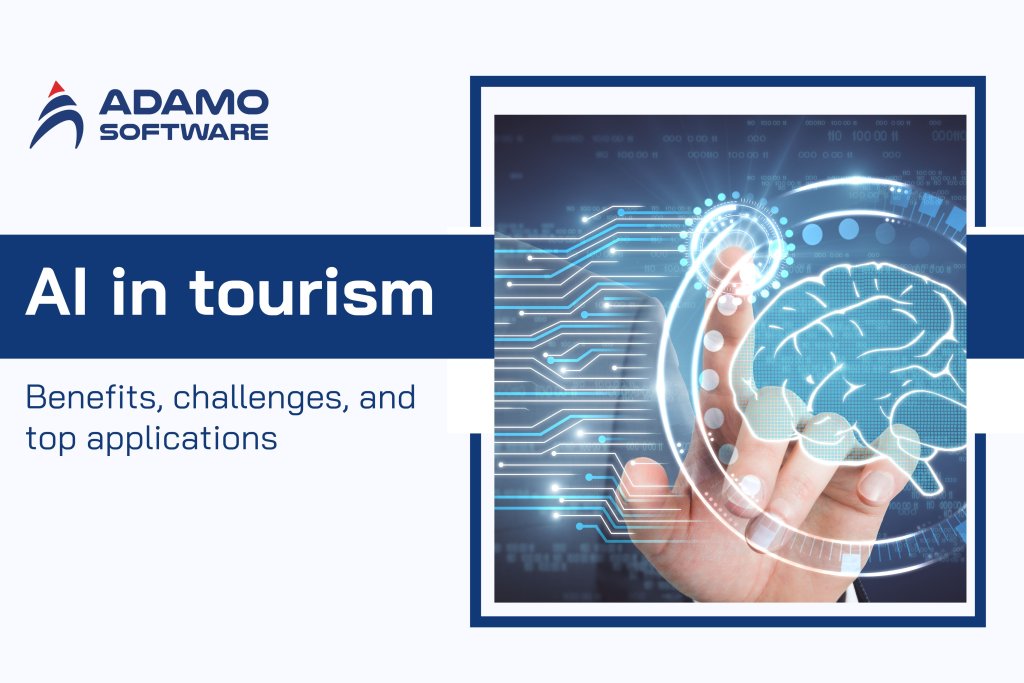AI in hospitality industry: Key advantages, challenges & future outlook
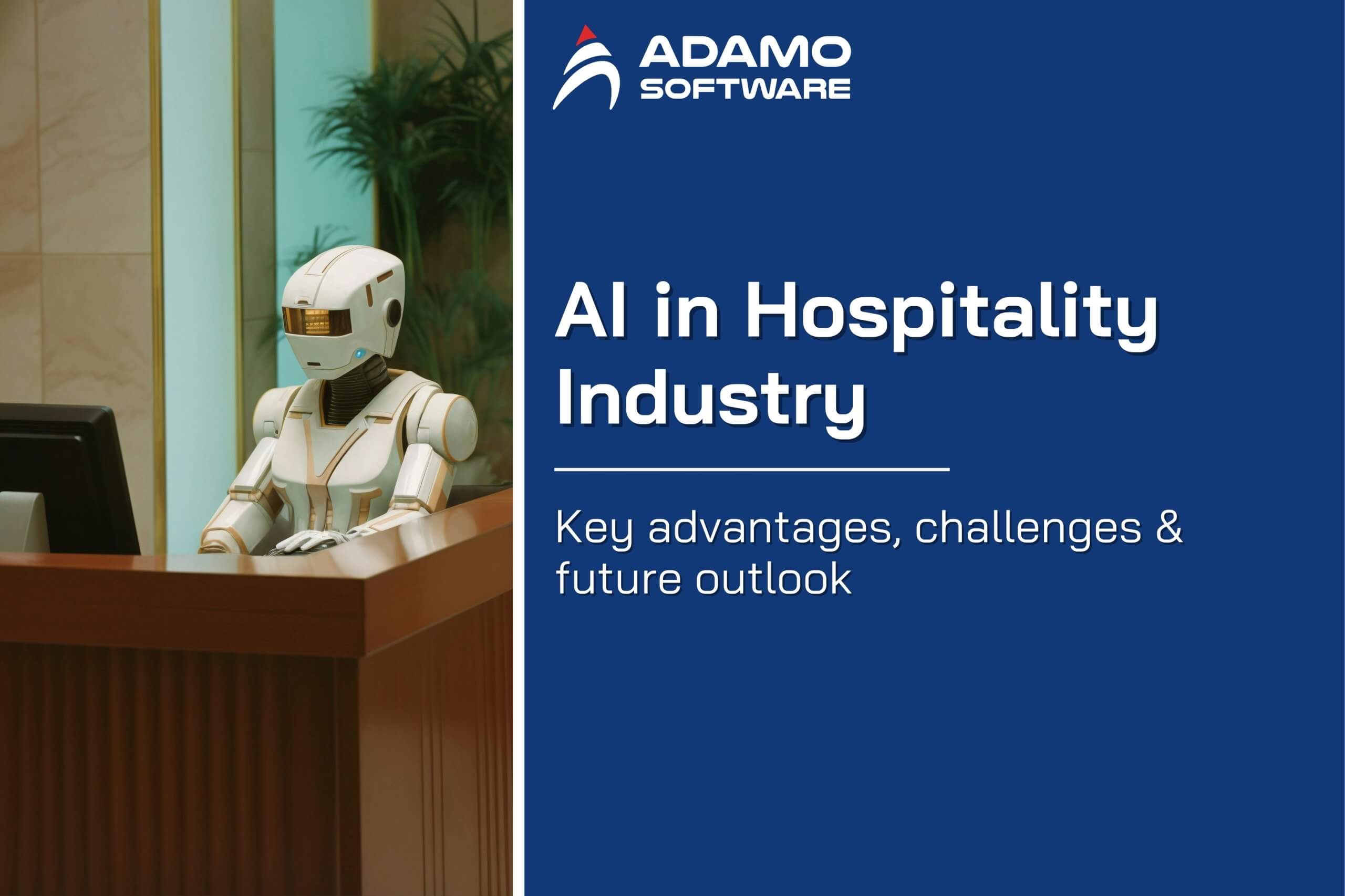
Explore how AI in hospitality industry enhances guest experiences, boosts efficiency, and shapes the future of hotels.
Artificial Intelligence (AI) is becoming a strategic tool for businesses in the hospitality industry. Not only does it help automate operational processes, but it also supports faster decision-making, optimizes revenue, and improves staff efficiency. Modern hotels equipped with AI can reduce operating costs, increase productivity, and enhance customer satisfaction — all with the ultimate goal of achieving sustainable profits.
This article will help hotel managers and owners understand:
- The main impacts of AI in the hospitality industry
- Key advantages of embracing AI-powered solutions in hospitality
- Challenges of AI in the hospitality industry
- Future trends to look forward to in AI in hospitality
I. What are the main impacts of AI in the hospitality industry?
These days, the question isn’t whether AI belongs in hospitality—it’s how to bring it in thoughtfully. Technology is already part of hotel life, shaping both guest experiences and back-office operations. The fundamental difference between progress and pushback depends on how wisely each business adopts it.
When AI in the hospitality industry takes over routine tasks, it gives hotel staff a bit more breathing space. Things like check-ins, booking confirmations, or simple service requests can be handled automatically. That way, people can spend more time on what really matters — empathy, genuine attention, and the kind of warmth that defines great hospitality.
Across hotels, AI is already creating visible changes:
- More brilliant service: AI-powered chatbots and virtual assistants answer common guest questions instantly, easing the pressure on staff and keeping responses fast and consistent.
- Personalized experiences: Through AI-driven personalization, hotels can tailor everything—from room setup and dining choices to curated local activities—based on each guest’s preferences and past behavior.
- Operational efficiency: Behind the scenes, AI in the hospitality industry helps teams schedule housekeeping, track inventory, and predict maintenance needs before issues arise—saving both time and money.
- Revenue optimization: AI-based forecasting tools adjust prices in real time, helping hotels anticipate demand, maximize occupancy, and make more data-driven decisions.
So no, AI in the hospitality industry isn’t replacing hospitality—it’s refining it. Automating what’s repetitive gives people more space to do what machines can’t: connect, understand, and make guests feel at home.
II. What are the key advantages of embracing AI-powered solutions in hospitality?
AI is no longer a futuristic concept — AI in the hospitality industry is already transforming how hotels serve guests, manage operations, and make more informed business decisions. The goal isn’t to replace the human touch, but to free hospitality teams to focus on what truly defines excellent service: connection, empathy, and care.
Let’s look at the most significant advantages of AI in the hospitality industry today:
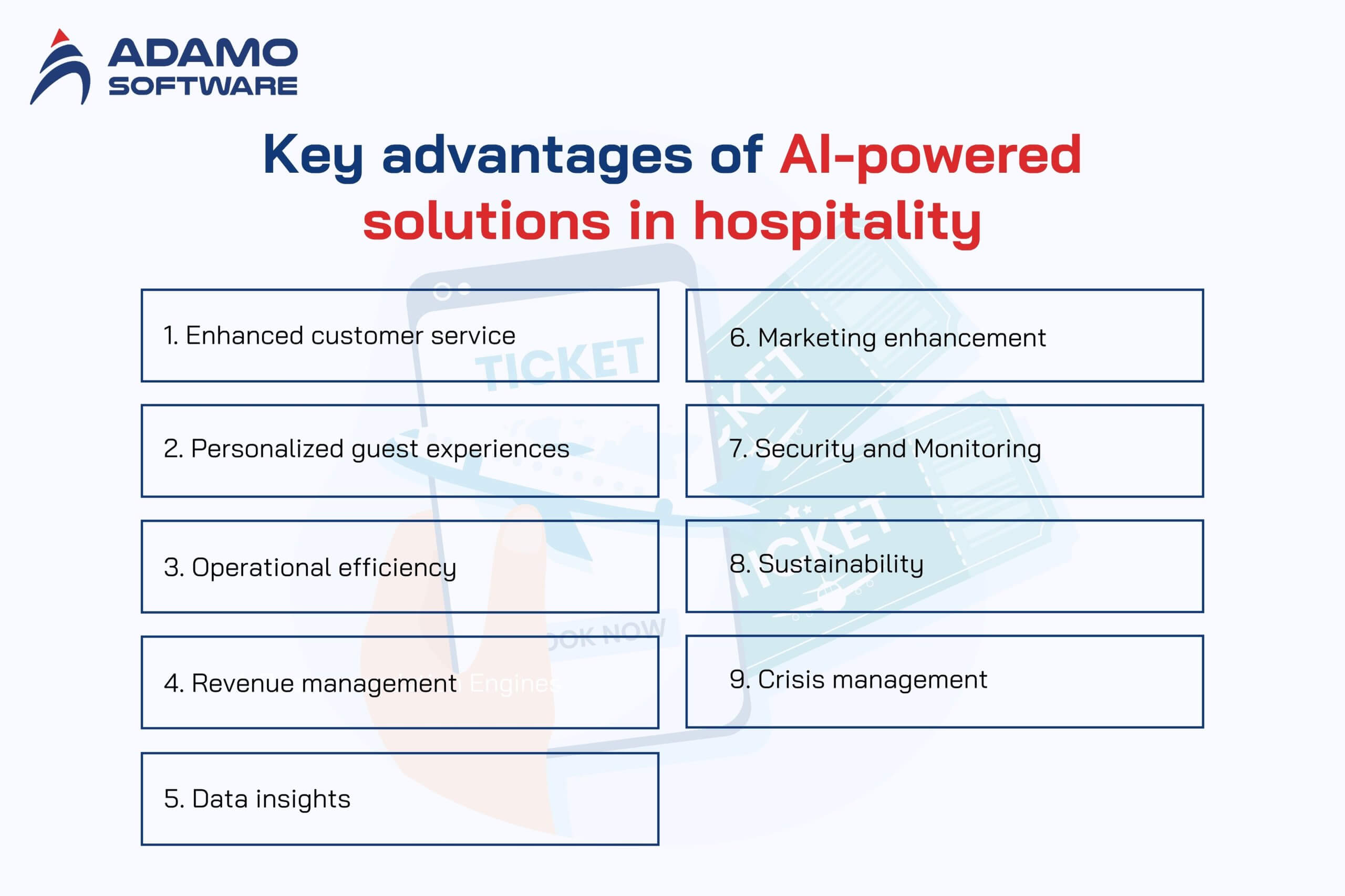
- Enhanced customer service: Faster, smoother, and more consistent experiences for guests.
- Personalized guest experiences: Making every stay feel thoughtful and unique.
- Operational efficiency: Streamlined workflows and happier teams.
- Revenue management: Data-backed pricing that keeps profits steady.
- Data insights: Turning guest information into more intelligent decisions.
- Marketing enhancement: More relevant campaigns with less guesswork.
- Security and Monitoring: Safer environments for guests and staff.
- Sustainability: Smarter energy use and waste reduction.
- Crisis management: Quick, coordinated responses during unexpected events.
1. Enhanced customer service
With AI tools in the hospitality industry, hotels can now deliver faster, smoother, and more consistent guest experiences. Instead of waiting for a night manager to answer routine questions, an AI-powered assistant can instantly suggest late-night dining options or book a ride for guests arriving after hours.
According to industry surveys, improving guest loyalty remains the top reason hotels invest in guest-facing technologies. With AI in the hospitality industry managing repetitive interactions, staff can focus on what matters most — remembering a returning guest’s favorite drink or checking in after a long trip.
2. Personalized guest experiences
Personalization is the new competitive edge. AI in the hospitality industry allows hotels to learn from each guest’s behavior — from preferred room temperature to favorite breakfast options — and tailor their stay automatically.
According to recent hospitality reports, hotels that utilize AI personalization experience higher guest satisfaction and repeat bookings. When travelers feel recognized and understood, they’re far more likely to return.
3. Operational efficiency
Hotels run around the clock, and even minor delays can impact the entire operation. By applying AI in the hospitality industry, managers can more accurately predict staffing needs, balance workloads, and automate housekeeping and maintenance schedules.
According to a NetSuite report, over half of hotels (51%) believe that improving efficiency is the top way AI will transform hotel operations. Beyond front-desk efficiency, AI is now improving coordination across sales, marketing, and general management teams.
4. Improved revenue management
Pricing a hotel room used to depend on instinct and experience. Now, AI analyzes demand patterns, seasonality, and competitor rates in real time to suggest the best price point for every moment.
When trained in strong business data, AI in the hospitality industry revenue management systems can help maximize occupancy, stabilize cash flow, and protect profit margins — whether during low or peak seasons. According to industry insights, hotels using AI-driven pricing often see improved profitability across all channels.
5. Data-driven insights
Every guest interaction generates valuable data — feedback, booking history, spending patterns, and more. AI transforms this sea of information into actionable insights, enabling hotels to forecast demand, enhance services, and lower costs.
According to research on hotel innovation, AI analytics is ranked among the top emerging technologies for hospitality. By translating data into trends and opportunities, AI in the hospitality industry enables managers to make informed decisions based on evidence, rather than assumptions.
6. Enhanced marketing strategies
Today’s travelers can easily tell when a marketing message feels generic. With AI in the hospitality industry, brands can analyze guest behavior and craft targeted campaigns that truly resonate with their audience.
From creating personalized offers to managing social media responses, AI allows marketing teams to work smarter and sound more human. According to marketing studies in the hospitality industry, AI-supported campaigns tend to achieve higher engagement rates and better conversion outcomes.
7. Security and monitoring
Safety remains a top priority for hotels. AI in the hospitality industry enhances surveillance systems, manages building access, and alerts staff to unusual activities in real time.
According to a survey of hospitality IT professionals, 68% view guest and staff safety as their main technology initiative. AI-driven monitoring tools enable faster, more proactive, and less intrusive security for guests.
8. Sustainability efforts
Sustainability has evolved from a buzzword to a business strategy. AI now powers innovative energy management systems that reduce waste, automatically adjust lighting, and optimize water usage.
By applying AI to sustainability programs in the hospitality industry, hotels not only reduce operational costs but also meet the expectations of eco-conscious travelers. These changes help properties shrink their carbon footprint while improving brand perception.
9. Crisis management
No hotel is immune to unexpected events — from storms to system failures. AI-powered tools in the hospitality industry can analyze risks, automate responses, and communicate updates to guests in real-time.
For example, generative AI can draft emergency notifications or weather alerts that guide guests calmly and transparently. This ability to stay organized and responsive during crises builds trust and protects the hotel’s reputation.
Let’s explore how AI in travel industry is changing traveler experiences here.
Explore Our Tailor-made Software Development Solutions
We are confident in providing end-to-end software development services from fully-functioned prototype to design, MVP development and deployment.
III. Challenges of AI in the hospitality industry
Although AI is bringing many positive changes to the hotel industry, its practical application is not simple. After the benefits, such as automation and personalization of customer experience, there are still several barriers that deter many businesses.
1. High implementation costs
Not all hotels have the potential to invest in AI. The cost is not only for software or equipment, but also for operation and maintenance. According to the survey, up to 30% of hotel managers cited high investment costs as the primary reason for their hesitation. Basic models cost a few thousand euros, while advanced solutions can cost up to hundreds of thousands – a number too large for small and medium-sized hotels.
2. Concerns about data security
One of the biggest challenges of AI lies in protecting customer data. AI systems often process a large amount of sensitive information, such as payment card details, personal preferences, or contact information – data that is easily accessible to hackers.
According to Trustwave’s Hospitality Sector Threat Landscape report, 31% of hotel businesses have experienced data leaks, and 89% of them have been attacked multiple times, with each incident resulting in an average loss of approximately € 3.2 million. Therefore, to maintain their brand reputation, hotels need to invest in cybersecurity in parallel with the deployment of AI seriously.
3. Resistance from employees
AI makes many people worried – both afraid of being replaced and concerned about keeping up with new technology. Up to 59% of hotel managers admit that the lack of skills and employee hesitation are significant barriers to implementing AI. When technology deeply intervenes in stages such as customer care, work shift assignment, or internal communication, many people feel “losing control.” Without a clear training and support plan, digital transformation can easily be slowed down.
IV. Future trends to look forward to in AI in hospitality
AI in the hospitality industry is profoundly changing the way hotels operate and serve customers. In the coming time, this technology will not only help businesses save costs but also create more personalized and sustainable experiences for travelers. Here are seven notable trends.
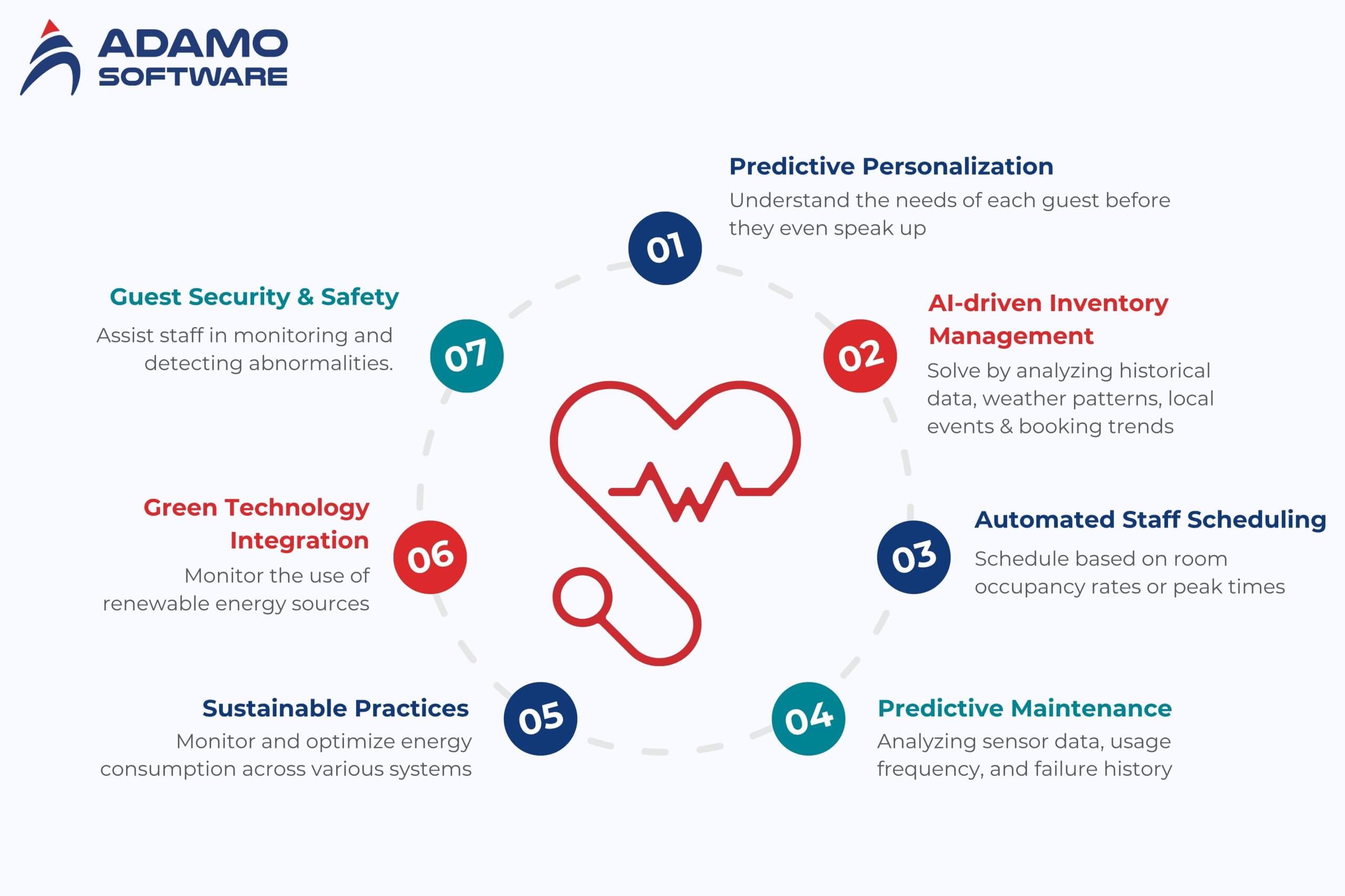
1. Predictive Personalization
AI in the hospitality industry allows hotels to understand the needs of each guest before they even speak up. By analyzing booking data, online behavior, and past feedback, the system can suggest the most suitable room, meal, or activity for each person. According to a survey by the European Hotel Industry, 56% of managers believe that AI can help create more personalized marketing campaigns, and 52% expect AI to improve customer service.
2. AI-driven Inventory Management
In hotels or restaurants, predicting demand is always a complex problem. AI in the hospitality industry helps solve this by analyzing historical data, weather patterns, local events, and booking trends to make accurate forecasts. As a result, businesses can reduce food waste, optimize supplies, and move toward greener operations.
3. Automated Staff Scheduling
Instead of having to arrange shifts manually, AI in the hospitality industry can schedule based on room occupancy rates, peak times, or individual employee performance. The system helps allocate staff appropriately, ensuring sufficient service while also enabling employees to have a more balanced work schedule—a crucial factor in retaining staff.
4. Predictive Maintenance
A broken air conditioner in the middle of summer can ruin the entire guest experience. AI in the hospitality industry helps avoid this by analyzing sensor data, usage frequency, and failure history to predict when equipment needs maintenance. This enables hotels to address issues before they arise, thereby reducing emergency repair costs and ensuring consistent service quality.
5. Sustainable Practices
AI helps businesses monitor and optimize energy consumption across various systems, including lighting and air conditioning. Some hotels have utilized AI in the hospitality industry to detect when guests leave their rooms, automatically turning off the lights and adjusting the temperature, thereby significantly reducing energy consumption. This is a crucial step for the hotel industry to move closer to its goal of sustainable development.
6. Green Technology Integration
Not only does AI in the hospitality industry extend beyond saving energy, but it can also coordinate with other green technologies, such as solar energy and IoT. The system can monitor the use of renewable energy sources, track the recycling process, or control the amount of organic waste, thereby contributing to the development of an environmentally friendly brand image.
7. Guest Security and Safety
AI can assist staff in monitoring and detecting abnormalities through cameras, sensors, or facial recognition systems. When suspicious signs are detected, the system will promptly alert staff to address them. In addition, AI in the hospitality industry’s facial or voice recognition also helps the check-in, authentication, and security process become faster and safer.
V. Final thoughts
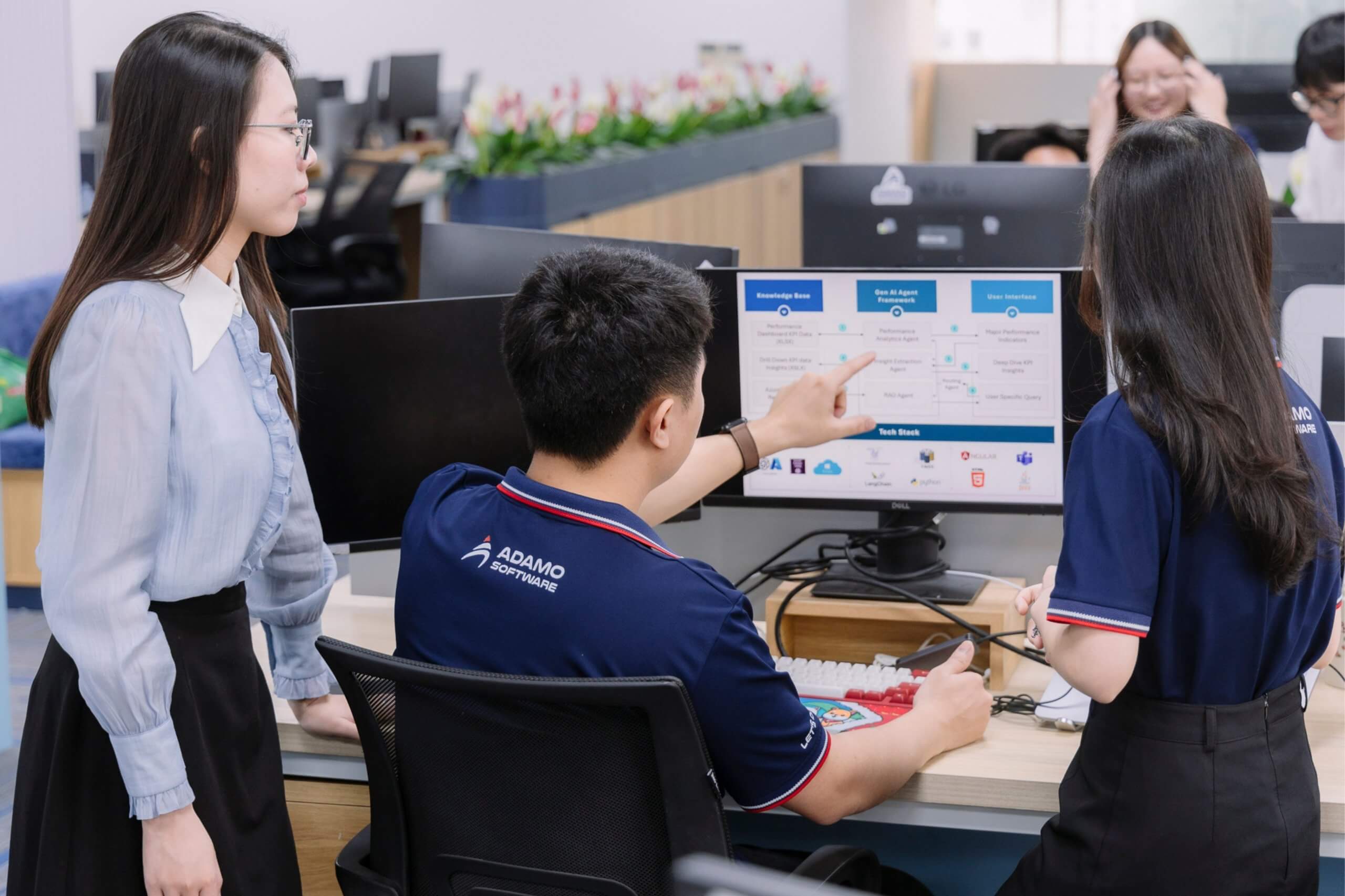
AI in the hospitality industry is becoming an integral part, from improving customer experience to optimizing operations and revenue management. When implemented correctly, AI does not replace humans but frees up staff to focus on important moments, providing dedication, creativity, and personalized experiences for guests.
For hotels and resorts seeking effective digital transformation, Adamo Software offers cutting-edge AI development solutions tailored to the hospitality industry. This helps automate processes, boost profits, and enhance guest satisfaction.
Ready to elevate your hotel experience with AI? Contact Adamo Software today to explore travel and hospitality software solutions for the hospitality industry that meet your business needs.
FAQs
1. What does AI in the hospitality industry mean?
It’s simply about utilizing innovative technology to enhance hotel operations. From chatbots that answer guests 24/7 to systems that predict demand or customize rooms, AI enables staff to focus on guests instead of paperwork.
2. How does AI actually benefit hotels?
It saves time, reduces mistakes, and helps create smoother guest experiences. For example, AI in the hospitality industry can suggest the correct room rate, predict busy days, or even remember a returning guest’s favorite drink.
3. What makes it hard for hotels to use AI?
The main challenges are cost, data security, and staff training. Setting up AI in the hospitality industry’s tools can be expensive, and hotels must ensure that guest information remains secure. Additionally, employees often require time to become accustomed to new technology.
4. Is AI replacing humans in hospitality?
Not at all. AI handles routine work — humans still bring the warmth and empathy guests remember. Think of AI in the hospitality industry as an extra pair of hands, not a replacement for people.
5. How big is the AI market in hospitality?
According to a report by WeMarketResearch, the market is valued at around $90 million in 2023 and is projected to reach $8 billion by 2033. That growth shows how quickly hotels are adopting smarter, data-driven tools.
6. What about data privacy risks?
Because AI in the hospitality industry often stores guest details, such as names and payment information, hotels must strengthen their cybersecurity. Some reports say over 30% of hospitality businesses have experienced a data breach, which means protection can’t be optional.
7. What is predictive personalization in hotels?
It’s when AI uses guest data to predict what someone might want before they even ask — such as setting the room temperature, suggesting restaurants, or offering personalized promotions. It’s a significant reason travelers feel “understood” during their stay.



